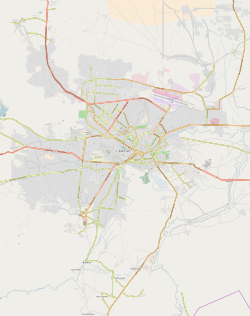Attack
The attacks started in the gurdwara's sanctuary area where 200 worshipers were praying at about 7:45 am interrupting worship that started an hour earlier. The attackers threw grenades and broke into the shrine then started opening fire on people. [10] Afterwards, the attackers took hostages inside of the building, exchanging fire with security forces till all three attackers were killed and at least 80 hostages freed after a shootout that lasted for 6 hours. [4] [11] [12] After the attack, Afghan and NATO soldiers helped with the clearance operation.
On Thursday, as families of the deceased and members of the community were conveying the bodies to the burial grounds in the Qalacha area in the afternoon, another blast was reported to have gone off remotely, near the crowd. [13] There were no casualties from the blast. [14]
This was not the first such attack on Sikhs; a similar Islamic State attack on Sikhs killed many in Jalalabad in 2018. Gurdwaras have also been damaged previously, such as during the Battle of Jalalabad (1989) and the Afghan Civil War of the 1990s.
Perpetrator
Initial government reports suggested that Ashraf Ghani's government blamed Haqqani network for the attack, but Taliban denied its role. [15] Shortly after, the SITE Intelligence Group announced that the Islamic State of Iraq and the Levant – Khorasan Province claimed responsibility right after the attack through various social media accounts. [16] [17] The gunman was identified as Abu Khalid al-Hindi, an Indian citizen from Padne in the Kasargod district of Kerala state. [8] [18] An Indian source revealed al-Hindi was wanted in a 2016 NIA case, and had previously worked as a shopkeeper in his native town. [18] The Afghan NDS said the perpetrator left India in 2018 to join ISIS Khorasan in Afghanistan. [19] Indian intelligence agencies identified him as Mohammed Sajid Kuthirummal. [20]
In a communique, the ISIS said the attack was carried out in response to the "Indian government's actions in Jammu and Kashmir". [21] The attack mastermind and ISIS-K emir Abdullah Orakzai, alias Aslam Farooqi, was captured by the National Directorate of Security on 4 April along with 19 others. [22]
The Afghan National Directorate of Security in April arrested a group of eight that included operatives from both ISIS-K and Haqqani network. Another five members were killed in the raid which happened in Kabul. The group was involved in many attacks including on the gurdwara, the rocket attack on a ceremony during which Ashraf Ghani was sworn in as the President in March 2020 and a rocket attack on Bagram Airfield in April. [23] It was reported that one of the arrested ISIS militants was linked to Pakistan's ISI. [24] [25]
This page is based on this
Wikipedia article Text is available under the
CC BY-SA 4.0 license; additional terms may apply.
Images, videos and audio are available under their respective licenses.
